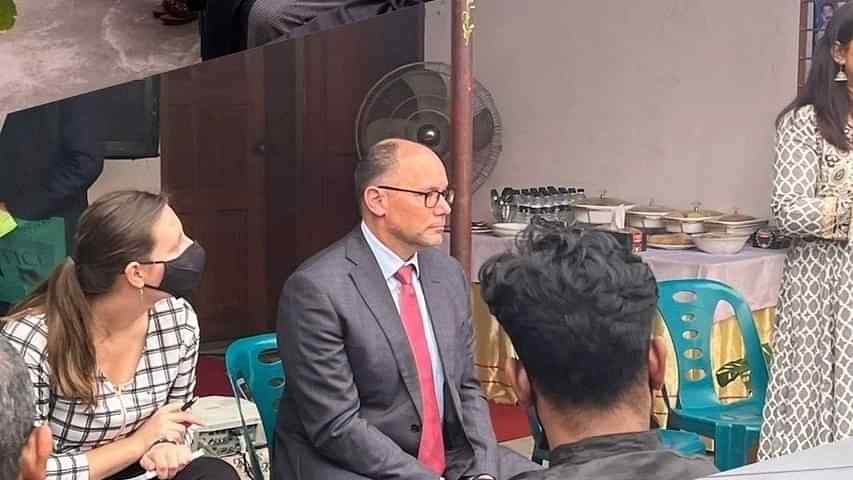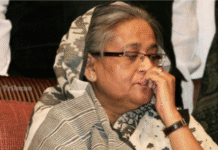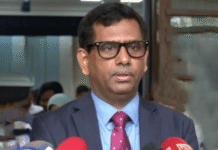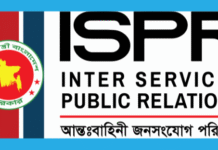
By Ahammad Foyez on Dec 16, 2022
Benar News
U.S.-Bangladesh tensions notched up this week after protesters caused the American ambassador to Dhaka to cut short a visit to the home of the mother and sister of a missing opposition politician for security reasons.
A group of people gathered outside on Wednesday as envoy Peter Haas was visiting the home of the Bangladesh Nationalist Party official believed to have been the victim of enforced disappearance. They demanded the United States raise concerns about martial law during the military regime of Ziaur Rahman in 1977. Rahman founded the BNP a year later.
Officials from the ruling Awami League party, pro-Awami organizations and professionals later criticized Haas for not visiting a memorial site that same day, the 51st anniversary of Martyred Intellectuals Day when pro-Pakistani forces killed Bangladeshi intellectuals during the 1971 war of independence.
“Human rights are at the center of U.S. foreign policy. Ambassador Haas met with members of Mayer Daak [mother’s call], a platform for the families of victims of alleged enforced disappearances, to hear their stories and learn about their experiences. It is critical to listen to the voices of all survivors – no matter their affiliation,” the U.S. Embassy said in a Facebook post.
The controversy stemmed from Haas being force to leave a meeting with the family of Sajedul Islam Sumon, a BNP leader who went missing in December 2013.
The fallout from the ambassador’s visit appears to have ratcheted up bilateral tensions over human rights. These started when the Biden administration imposed sanctions last December on several former and current leaders of the Rapid Action Battalion, (RAB), a Bangladesh security unit notorious for carrying out alleged enforced disappearances and extrajudicial killings.
After cutting short the visit, Haas went to see the Bangladesh Foreign Minister A.K. Abdul Momen later on Wednesday to air his concerns about the incident at Sumon’s house.
The Bangladesh minister told reporters that during his meeting with Haas, the ambassador said many people had gathered outside the house and wanted to speak to him.
“His security personnel advised him to leave the house immediately, saying they feared his vehicle could be blocked. Following that advice, Haas left the house quickly because of security concerns,” Momen said.
Also on Wednesday, Awami League General Secretary Obaidul Quader criticized Haas’ visit, saying it would have been better if he had visited the memorial to the martyred intellectuals instead.
“But he went to the BNP leader’s house. With due respect, I want to ask him, how many people go missing in the United States every month? How many rape victims are there? We saw that on CNN,” Obaidul said.
The next day, Hasan Mahmud, the Awami League’s joint general secretary who serves as information and broadcast minister, said Haas could have stayed above any controversy if the U.S. would accept a memorandum recognizing the Mayer Kanna [mother’s cry] – a platform for families of victims of martial law in 1977.
“On the day of Martyred Intellectuals Day, those who invited the U.S. ambassador to their house actually made him controversial. It was not for the organizers to embarrass the U.S. ambassador in this way,” the minister said.
A group of pro-Awami League intellectuals and university teachers also issued statements criticizing Haas for his visit.
State Department’s response
While answering a question about Haas’ meeting, a State Department spokesman in Washington said the U.S. was committed to raising human rights concerns in Bangladesh and elsewhere.
“[A]s a key element of our bilateral relationship, we raise human rights with our Bangladeshi counterparts when we have concerns about developments that erode space for independent media, civil society, and free and fair elections,” spokesman Vedant Patel told a press briefing on Wednesday.
“As it relates to the specific meeting that you mentioned, the U.S. ambassador and embassy staff concluded a meeting early on Dec. 14th to – due to security concerns. And we have raised our concerns about this matter at the highest levels of the Bangladeshi government.”
The opposition BNP, meanwhile, alleged that the government was harassing Haas.
“The language spoken by Prime Minister Sheikh Hasina, Awami League General Secretary Obaidul Quader, the foreign minister and other government officials after this incident with the U.S. ambassador justified that the government as well as ruling Awami League were involved in it,” BNP Acting Office Secretary Syed Emran Saleh Prince told reporters in Dhaka on Thursday.
Momen tried to downplay the incident, telling reporters on Thursday that it would not affect relations with the U.S., while adding it was not a security threat.
In recent weeks, however, Bangladesh’s government had criticized the United States and United Nations for what it described as their meddling in domestic affairs after both raised concerns about a climate of political violence and intimidation in the South Asian nation.
This happened as the BNP staged a series of huge rallies demanding that Prime Minister Sheikh Hasina’s government step aside to let a neutral caretaker government oversee the next general election. Her government, which has ruled Bangladesh since 2009, is refusing to give in.
The BNP staged the biggest of its rallies in Dhaka on Dec. 10, which is observed worldwide as Human Rights Day. The day also marked the first anniversary of the U.S. decision to impose sanctions on RAB.









